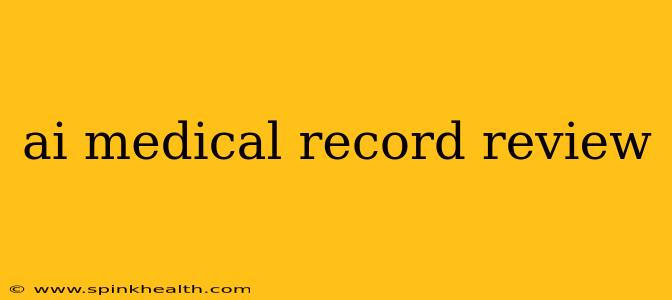The world of healthcare is constantly evolving, and with it, the need for efficient and accurate medical record management. The sheer volume of patient data generated daily is overwhelming, even for the most dedicated medical professionals. This is where Artificial Intelligence (AI) steps in, revolutionizing how we review and analyze medical records. This isn't just about speed; it's about unlocking hidden insights to improve patient care and streamline administrative processes. Let's delve into the fascinating world of AI medical record review and explore its transformative potential.
Imagine a world where tedious tasks like chart abstraction are automated, allowing doctors to spend more time with their patients. This isn't science fiction; it's the reality AI is shaping. AI-powered systems can sift through mountains of data, identifying crucial information like diagnoses, medications, allergies, and procedures with remarkable speed and accuracy. But the benefits go far beyond simple data extraction.
What Can AI Do in Medical Record Review?
AI's role extends far beyond simple data extraction. It's capable of much more sophisticated tasks:
- Identifying inconsistencies and errors: AI can detect discrepancies in medical records, flagging potential errors for human review, ensuring data integrity and patient safety. This might involve spotting conflicting medication lists or inconsistencies in patient history.
- Predictive analytics: By analyzing patterns in medical records, AI can predict future health risks and outcomes, enabling proactive intervention and personalized treatment plans. For example, it might identify patients at high risk of developing certain conditions, allowing for timely preventative measures.
- Improving clinical decision-making: AI provides physicians with data-driven insights, assisting them in making informed decisions about diagnosis, treatment, and patient management. This means better outcomes and more effective care.
- Streamlining administrative tasks: AI automates time-consuming tasks, freeing up administrative staff and clinicians to focus on what truly matters – patient care. Think billing, coding, and report generation.
- Enhancing patient safety: AI can identify potential adverse drug events or interactions, alerting medical professionals and contributing to a safer healthcare environment.
How Accurate is AI in Medical Record Review?
The accuracy of AI in medical record review is constantly improving. While not perfect, AI algorithms are trained on vast datasets of medical records, and their accuracy rates are steadily increasing. The key is to understand that AI serves as a powerful tool to assist human clinicians, not replace them. Human oversight and validation remain crucial for ensuring the accuracy and reliability of the results.
What are the Challenges of Using AI for Medical Record Review?
Despite its tremendous potential, implementing AI in medical record review comes with its own set of challenges:
- Data privacy and security: Protecting patient data is paramount. Robust security measures are crucial to prevent data breaches and maintain patient confidentiality.
- Data quality: AI algorithms are only as good as the data they are trained on. Inconsistent or incomplete data can lead to inaccurate results. High-quality, standardized data is essential.
- Integration with existing systems: Integrating AI systems with existing electronic health record (EHR) systems can be complex and require significant investment.
- Regulatory compliance: Meeting regulatory requirements, such as HIPAA in the United States, is crucial for ensuring legal compliance.
- Cost of implementation: The initial investment in AI technology and infrastructure can be substantial.
What are the Future Implications of AI in Medical Record Review?
The future of AI in medical record review is bright. We can expect to see:
- More sophisticated algorithms: AI will become even more accurate and efficient in analyzing medical records, extracting more meaningful insights.
- Wider adoption across healthcare systems: As the technology matures and its benefits become more apparent, AI will be more widely adopted in healthcare settings.
- Greater integration with other healthcare technologies: AI will be integrated with other technologies, such as telehealth and wearable sensors, to create a more holistic view of patient health.
- Personalized medicine: AI will enable the development of personalized treatment plans based on individual patient data and characteristics.
In conclusion, AI medical record review is transforming the healthcare landscape. While challenges remain, the potential benefits—improved efficiency, accuracy, patient safety, and the delivery of better care—are undeniable. The journey has just begun, and the future holds incredible promise for AI's role in shaping a more efficient and effective healthcare system.

